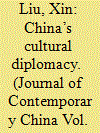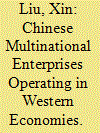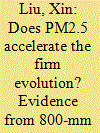| Srl | Item |
| 1 |
ID:
167332


|
|
|
|
|
| Summary/Abstract |
This article explores the prominent features of China’s state-led campaign of cultural diplomacy. Through multiple comparative case studies of its flagship project of the Confucius Institute (CI), it aims to identify and contextualise the various variables affecting its effective operation. It finds that this dependent variable is mainly determined by the independent variable of the CI’s ability to localise its product and process to suit different target audiences, along with a number of extraneous variables, including ideology, nationalism and the media environment in the destinations. People-to-people interaction is also an important mediator that contributes to facilitating mutual understanding. All the variables and the complexity of their inter-relations constitute the Chinese characteristics and are charted out in a diagram.
|
|
|
|
|
|
|
|
|
|
|
|
|
|
|
|
| 2 |
ID:
178738


|
|
|
|
|
| Summary/Abstract |
Huawei serves as a vehicle for presenting the multiple barriers faced by Multinational Enterprises (MNEs) that happen to be born in China, a non-democratic and non-Western country who now challenges the world’s No.1 superpower, thus requires a multi-disciplinary analytical framework by taking much broader contexts into considerations. This comparative case study of its operations in the US and UK aims to develop the old model of examining Chinese MNEs that is heavily economic factor focused by including more variables, such as ‘bilateral relations’, ‘law’, ‘media influence’ and ‘cultural proximity’ under host country factors, and ‘governance structure’ under home country factors. The new model will show the increasing complexity in the global competitive landscape and inspire more research to further advance understanding of this new international business phenomenon.
|
|
|
|
|
|
|
|
|
|
|
|
|
|
|
|
| 3 |
ID:
192739


|
|
|
|
|
| Summary/Abstract |
Accurately recognizing the impact and mechanism of PM2.5 on firms is essential for China to achieve both the reduction of PM2.5 and economic growth. Based on the differing levels of PM2.5 concentration between both sides of the 800 mm isoline, we construct a quasi-natural experiment to investigate the impact of PM2.5 on firm evolution and regional economic efficiency. We further evaluate the role of government governance in achieving both PM2.5 reduction and regional economic efficiency improvements simultaneously. Results indicate that M2.5 disturb the process of firm evolution and influences regional economic efficiency through different effects. More importantly, the results show that in regions with strong governance, reducing PM2.5 could improve macroeconomic efficiency without hampering economic growth. In contrast, regions with weak governance tend to experience an increase in PM2.5 severity as economic growth advances. The evidence presented in this paper on the relationship between PM2.5 and economic development provides a new perspective to formulate policies for policymakers.
|
|
|
|
|
|
|
|
|
|
|
|
|
|
|
|
| 4 |
ID:
186291


|
|
|
|
|
| Summary/Abstract |
Social theories of International Relations (IR) are normally premised on a deep distinction between public and private spheres. Whether articulated as ‘capitalism’, ‘the market’, or ‘civil society’, all attribute some analytical priority to the private, with explanatory significance for the public sphere and therefore also central to the critique of realism in International Relations. Liberalism in particular sees the source of peace as a flourishing private sphere that narrows the scope of the otherwise violent, war-prone orientation of the public which defines states. However, we argue that this orientation is ill-equipped to grapple with the world-historical significance of the ‘Rise of China’ that is better understood instead as a form of industrialism not premised on the public/private distinction. This inapplicability of categories foundational to liberal IR theory leaves it unable to meaningfully engage the Rise of China debate. Using Uneven and Combined Development (U&CD), this paper elaborates industrialism as a pattern of state-led development in China that prioritises industrial capacity as an end over strictly private objectives (e.g. profits). Arising in substantial part from the exigencies of political multiplicity, industrialism seeks national unity and vindication of a distinct civilisational identity through the pragmatic means of industrial capacity under conditions of modernity. Whilst this argument partly echoes the developmental state literature, it goes further by visualising this across both the longue durée and the current conjuncture, right up to the much-discussed Belt and Road Initiative. Finally, the argument emphasises U&CD’s potential to originate a simultaneously non-liberal and non-realist account of the implications of China’s rise.
|
|
|
|
|
|
|
|
|
|
|
|
|
|
|
|